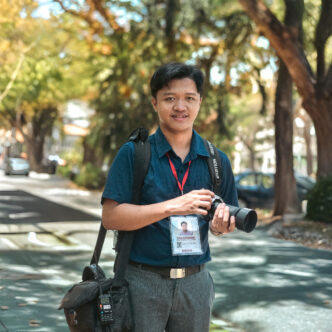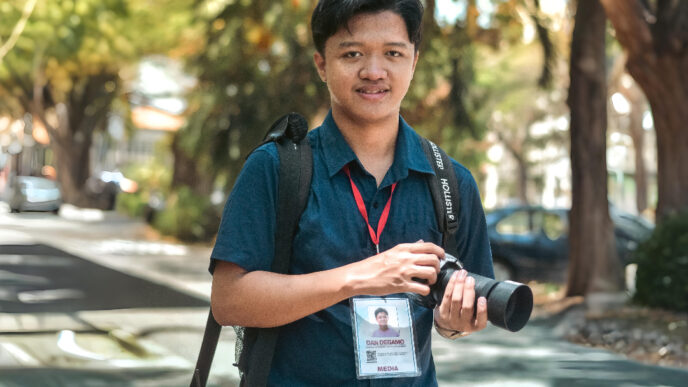By Genno Gabriel Rabaya
The torch lit by the former Alto Broadcasting Station (ABS) began dimming after founders Jim Lindenberg and Tony Quirino were found constantly at odds with each other’s leadership of the station by 1956, ten years after its inception. Had nothing been done, what was initially ignited for the future of Philippine broadcasting would have completely extinguished. That was until the torch was passed on to a new leader—Eugenio Lopez Jr., a man with a dream.
Today’s broadcasters and journalists often ponder on how the Philippine broadcasting landscape has been shaped. As mass communication students, we look up to the people on our television screens. From celebrity interviews to the coverage of the strongest typhoons, these reporters continue to inspire us to tell and fight for the truth. As the leading broadcasting network of the country, ABS-CBN continues to uphold its motto: In the service of the Filipino. Yet, Eugenio Lopez Jr.’s legacy would be the key to drive the network to where it is now.
Described as energetic and mischievous by his own family, Eugenio Lopez Jr., better known as ‘Geny’, was the eldest child of Don Eugenio Lopez Sr. The high-spirited Geny grew up with the reputation of being the black sheep of the family. “I used to cut classes. I would goof off and my father would find out, of course, and get angry,” Geny once quipped. Despite this, his enthusiasm to go on bold ventures was truly evident.
With several bouts of disciplinary problems, the exasperated Don Eugenio deemed it was enough for him to send Geny to the Virginia Military Institute, USA in 1947. His time there helped him discover how to properly harness his innate energy. Now geared with discipline and structure, Geny returned to the Philippines by 1953 where he primarily focused on running the Chronicle, one of Manila’s leading papers at the time.
Among Don Eugenio’s five children, Geny was the one who inherited his father;s aggressive business instincts, sharp intuition, and air of command. This became the reason why Don Eugenio pushed Geny to explore the venture of radio. Geny was initially reluctant as he wanted to exert his efforts in running the Chronicle first. However, both men had one thing in common—neither would take no for an answer. After applying for a franchise in the Congress and acquiring all the necessary equipment, Don Eugenio directed Geny to “Set it up.” With a newfound responsibility, Geny was given the command to lead the foundation of the Chronicle Broadcasting Network (CBN).
Designated the executive vice-president of CBN, Geny now reveled in the challenge of leading the radio network. CBN’s then-president Roberto “Bert” Villanueva, Don Eugenio’s right-hand man, decided to give free reins for their operations to Geny as he wanted to focus on arranging their financing instead. This was exactly what Geny wanted and how he found his footing as a leader.
By 1957, Don Eugenio was able to acquire ABS and named Bert as its president, with Geny still serving as the executive vice-president. Although Bert and Don Eugenio outranked Geny on paper, Geny was in charge of these companies in practice. By 1962, Geny knew he wanted to make these companies the Philippines’ largest network. Thus, the ABS-CBN TV network was born.
This, however, did not come easy. Facing numerous competition and the unfamiliarity of business, Geny faced these challenges head-on. He once said, “There is no substitute for hard work. There just isn’t any. Your competitor will work 24 hours a day; well, you have to work 25 if you want to beat him. It’s as simple as that.”
When US TV networks shifted to color in 1963, most Filipinos assumed that this transition would only be attainable after a decade or so. Yet, Geny wanted to make that shift immediately. By 1966, he pushed for the TV network to be in color. With the risk of heavier expenditures over color cameras and a full color set, it was unsure if this shift would benefit the network or not. But Geny was a gambler, and gamble he did. The opening of the Broadcast Center was the turning point of ABS-CBN’s history. The network’s veterans recalled how Geny propelled the network not only in its income, but in outworking the competition.
On the forefront of broadcasting canned and live shows, ABS-CBN was leading in most Filipino television screens. Yet, Geny was unhappy with how it seemed like the news programs were the network’s afterthought. What used to be composed of a small staff unit, the ABS-CBN News was the next venture that Geny wanted to spotlight. Geny was able to do exactly that as the network broadcasted notable historic events such as the Apollo 11 moon landing in 1969 and the Plaza Miranda bombing in 1973. However, the latter incident led to rumors of martial law spreading, until the rumor became a reality.
When dictator Ferdinand Marcos Sr. declared Martial Law, Geny saw his dream shattering. In September 13, 1971, platoons of soldiers stormed into the ABS-CBN Broadcast Center compound and seized the network’s operations. On that day, the television screens went dark. Although his dream seemed to have no future, Geny’s story was not yet over as it would soon rise from the ashes.
The EDSA People Power revolution was a pivotal moment in broadcasting history as the shutdown of Marcos’ televised press conference on February 24, 1986 eventually led to bringing the ABS-CBN network back on air. Wasting no time, Geny continued his legacy of building his dream—his baby.
“ABS-CBN was my baby. I gave my all to ABS-CBN. I sacrificed my family life. I gave it 110% of my time. And in a way, I’m sorry because I was not able to have the same kind of relationships that other parents have with their children. So I sacrificed that part of my life in favor of bringing up the broadcast business,” Geny once expressed.
As the frontier of Philippine broadcasting, Geny was determined to ensure that ABS-CBN delivers its promise to serve the Filipino, an ideal adored by many aspiring journalists. Considered to be the heart and soul of the network, Geny’s grit is something reflected not only in the network’s success but also in the values of the ABS-CBN’s reporters, writers, and employees of today.
A legacy that can be felt today, even with the discontinuation of the ABS-CBN franchise. As mass communication students, it is undeniable that the network’s long history and service helped in deciding the path we take—a path that fights for truth and stands firm amid uncertainty. ABS-CBN is not perfect but Geny’s determination alone has moved mountains in progressing the future of broadcasting and journalism.
Geny Lopez may not have been the one to light the torch of ABS-CBN, but he was enough to keep it burning.
Rabaya’s essay, “Enough to keep it burning,” is the first-runner up entry of the 2025 Ireneo and Asuncion Maslog Essay Writing Contest held last Aug. 20 at the Silliman University College of Mass Communication.












